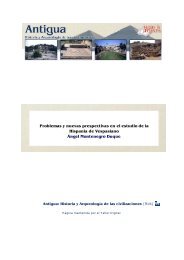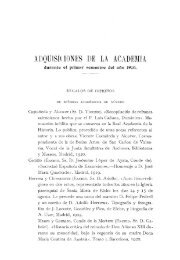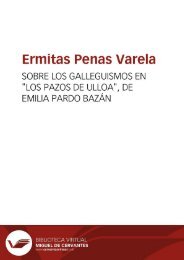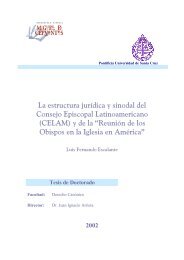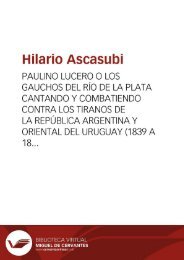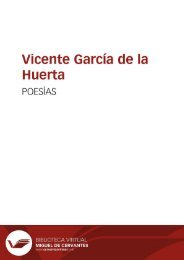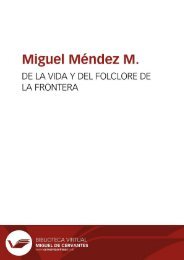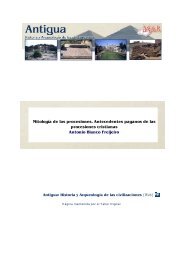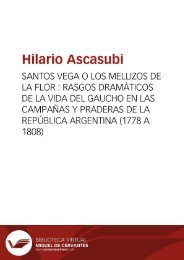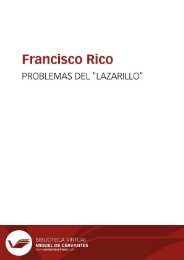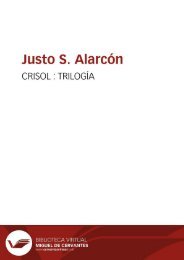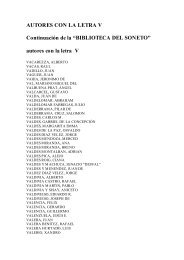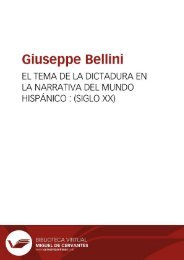Create successful ePaper yourself
Turn your PDF publications into a flip-book with our unique Google optimized e-Paper software.
Anales galdosianos [Publicaciones periódicas]. Año XII, 1977<br />
The «cuckold» meaning is, however, richer than this might suggest. It will be remembered that when<br />
Manso accompanied Irene and the children to the theater to see some Christmas plays, one of those<br />
witnessed was a travesty entitled El Nacimiento del Hijo de Dios , of which the protagonist-narrator<br />
says, « lo más repugnante de aquella farsa increíble era un pastor zafio y bestial, pretendiente a la<br />
mano de María, y que en la escena del templo y en el resto de la obra se permitía groseras libertades<br />
de lenguaje a propósito de la mansedumbre de San José. » 106<br />
Five years after the publication of El amigo Manso , <strong>Galdós</strong> returned, with Fortunata y Jacinta ,<br />
to the matter of the mansedumbre of San José in the naming and imagined cuckoldry of José Ido<br />
del Sagrario 107 in a novel in which the triangle situation is echoed with variation after variation in<br />
a series of trios. With his marriage to Fortunata, Maxi invites the cuckolding which soon follows,<br />
resulting in a pregnancy he imagines to have a supernatural cause. The all but identical first names<br />
of Manso and Rubín (Máximo/Maximiliano) is suggestive. Part of the novelist's interest in each case<br />
-despite the differences between the two characters- is to satirize with the inflated first name and<br />
then to portray men who, in important senses, live on the fringes of life and come to grief when<br />
they enter into it without full understanding of their own natures and those of others. As their stories<br />
begin Maximiliano and Máximo are living the «life of the mind» (pharmacy/philosophy), cared for<br />
by a mother figure (Doña Lupe/Doña Javiera). They then enter the affective world through interest<br />
of an amorous nature (although not fully understood as such because of their unworldliness) in an<br />
inappropriate woman (Fortunata/Irene) whose natural affections turn to a man more suited to her<br />
emotional needs (Juanito/Manuel). The competition is unequal and both Maximiliano and Máximo<br />
are defeated, whereupon they withdraw once more from the world, the former into lofty, rationalistic<br />
madness, the latter into death, i.e., the nonexistence with which the novel began. Maximiliano, in<br />
his final wise madness, says: « No contamos con la Naturaleza... Protestamos contra sus lecciones<br />
admirables, que no entendemos, y cuando queremos que nos obedezca, nos coge y nos estrella, como<br />
el mar estrella a los que pretenden gobernarlo » 108 . Máximo begins his story with: « Yo no existo<br />
» (9). In both characters <strong>Galdós</strong> is portraying the conflict between the natural and the rational and<br />
the two men share both real and figurative mansedumbre . The similarity of names having led us to<br />
106 Benito Pérez <strong>Galdós</strong>, El amigo Manso (Buenos Aires: Espasa Calpe, 1955), p. 65. Future<br />
references to this edition will be cited parenthetically in the text.<br />
107 Shoemaker, p. 117.<br />
108 Benito Pérez <strong>Galdós</strong>, Fortunata y Jacinta (Madrid: Ediciones Hernando, 1968), p. 1036.<br />
79




